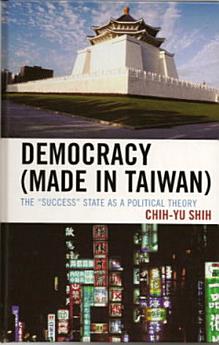Democracy (Made in Taiwan): The 'Success' State as a Political Theory
Chih-Yu Shih
Jan 2008 · Bloomsbury Publishing PLC
Ebook
298
Pages
reportRatings and reviews aren’t verified Learn More
About this ebook
Democracy (Made in Taiwan) argues that post-colonialism and Confucianism met at the historical moment when democratization and liberalization occurred in Taiwan. The familiar political science standards take little note of either Confucianism or postcolonialism. In fact, these standards are unbalanced, wishful, and Washington-centric, and result in a misunderstanding of Taiwan's performance. The liberal bias blinds international observers to the hybrid characteristics embedded in Taiwan's postcolonial history. Although this book is not about failing states per se, its criticism of the standards of success alludes to the problematic nature of the mainstream view of failing states. In many aspects, Taiwan is a disguised failure, or even a fake, in the sense that its democratization adopts a populist identity strategy rather than a liberal one. In addition, its foreign policy compliance to hegemonic leadership is characterized by anti-China determination, instead of a realist approach involving the calculation of power.
Having said this, the book does not criticize Taiwan for "failing" liberalism, in order to prevent the liberal teleology from lingering on. Instead, Taiwan serves as an arena of polemics on political science in this book. By rewriting domestic liberalism and external realism into meanings unknown to the hegemonic power, Democracy (Made in Taiwan) celebrates Taiwan's postcolonial fluidity. Embedded in a kind of ontological anomaly beyond the scope of mainstream political science, which takes for granted the ontology informed by individualism in domestic politics and statism in international relations, Taiwan's case appears subversive not because of the subversive nature of postcoloniality, but due to the inability of political science's liberalism to make sense of postcoloniality. Through decoupling the idea of political science from the entity known as Taiwan, this book attempts to achieve two goals: to re-present Taiwan and to call for reflexive political science.
Having said this, the book does not criticize Taiwan for "failing" liberalism, in order to prevent the liberal teleology from lingering on. Instead, Taiwan serves as an arena of polemics on political science in this book. By rewriting domestic liberalism and external realism into meanings unknown to the hegemonic power, Democracy (Made in Taiwan) celebrates Taiwan's postcolonial fluidity. Embedded in a kind of ontological anomaly beyond the scope of mainstream political science, which takes for granted the ontology informed by individualism in domestic politics and statism in international relations, Taiwan's case appears subversive not because of the subversive nature of postcoloniality, but due to the inability of political science's liberalism to make sense of postcoloniality. Through decoupling the idea of political science from the entity known as Taiwan, this book attempts to achieve two goals: to re-present Taiwan and to call for reflexive political science.
About the author
Chih-Yu Shih is chair and professor in the Department of Political Science at National Taiwan University.
Rate this ebook
Tell us what you think.
Reading information
Smartphones and tablets
Install the Google Play Books app for Android and iPad/iPhone. It syncs automatically with your account and allows you to read online or offline wherever you are.
Laptops and computers
You can listen to audiobooks purchased on Google Play using your computer's web browser.
eReaders and other devices
To read on e-ink devices like Kobo eReaders, you'll need to download a file and transfer it to your device. Follow the detailed Help Center instructions to transfer the files to supported eReaders.







